Your Guide to Staying Healthy This Season with Ridgeline Medical in Idaho Falls
Spring in East Idaho is a beautiful time of year—longer days, blooming flowers, and a fresh start for your health. But with the sunshine and new growth comes another seasonal shift: allergy season. Whether you’re experiencing sneezing fits, itchy eyes, or lingering fatigue, springtime allergies can take a real toll on your daily life.
At Ridgeline Medicalin Idaho Falls, we’re here to help you spring into wellnesswith practical health tips, allergy support, and expert care to help you feel your best all season long.
Understanding Spring Allergies in Idaho
Spring allergies are often triggered by tree pollen, grasses, and even mold sporesthat become airborne as the weather warms up. In East Idaho, common allergens include:
- Cottonwood
- Elm
- Juniper
- Sagebrush
- Grasses (like timothy and ryegrass)
When you breathe in these allergens, your immune system may overreact, leading to symptoms like:
- Sneezing
- Runny or stuffy nose
- Itchy, watery eyes
- Coughing or throat irritation
- Fatigue or brain fog
If you’re struggling with these symptoms, you’re not alone. Our providers at Ridgeline Medical offer effective allergy care, including over-the-counter recommendations, prescription treatments, and even allergy testing and referrals when necessary.
More on these Common Symptoms of Spring Allergies
Spring allergies can show up in a variety of ways—some are obvious, while others may be mistaken for a lingering cold or fatigue. Here’s what to watch for during allergy season in East Idaho:
1. Sneezing and Nasal Congestion
One of the most common signs of seasonal allergies is frequent sneezing, especially in the morning or after being outside. Stuffy or runny noses(with clear discharge) often go hand-in-hand and can make breathing through your nose difficult.
2. Itchy or Watery Eyes
Allergens like pollen and dust can irritate your eyes, causing itchiness, redness, swelling, and excessive tearing. Many people describe it as having “gritty” or dry-feeling eyes, even when they’re watering.
3. Coughing and Throat Irritation
Postnasal drip (when mucus drains down the back of your throat) is a common side effect of nasal congestion. This can lead to a dry, persistent coughor a scratchy, sore throat, especially in the morning or at night.
4. Fatigue and Brain Fog
Allergies can disrupt your sleep and drain your energy. Many people experience daytime fatigue, difficulty concentrating, or general brain fogdue to poor sleep quality and chronic inflammation caused by allergy flare-ups.
5. Sinus Pressure and Headaches
Blocked sinuses can create pressure around the eyes, forehead, and cheeks, which may lead to headachesand facial pain—particularly if your allergies are left untreated or develop into a sinus infection.
6. Itchy Skin or Rashes
Some people experience itchy skin, hives, or eczema flare-upsduring allergy season, particularly if they’re sensitive to outdoor allergens or have allergic contact dermatitis.
Spring Health Tips for a Stronger You
Allergy season isn’t the only thing spring brings—it’s also the perfect time to reset your wellness routine. Here are a few simple ways to support your health this season:
1. Stay Ahead of Allergies
Start taking antihistamines or allergy medications beforesymptoms hit. This preventative approach can reduce inflammation and keep symptoms under control. Keep windows closed on high pollen days, and shower after spending time outdoors to wash away allergens.
2. Hydrate More
Spring weather can be dry in Idaho Falls, and dehydration can worsen allergy symptoms. Aim to drink at least 8 glasses of water a day to support your immune system and keep mucus membranes hydrated.
3. Get Moving Outside (Safely)
Exercise boosts your immune system and improves mood—but be smart about it. Avoid working out outdoors when pollen counts are highest (typically mid-morning to early afternoon), and opt for lower-pollen times like early morning or after rain.
4. Check in on Your Mental Health
Long winters can impact mental health. Spring is a great time to reconnect with loved ones, spend time outdoors, and check in with a provider if you’re feeling anxious or low.
5. Schedule Your Wellness Visit
Spring is a great time to catch up on your annual physicalor wellness screening. Whether you need lab work, preventive care, or help managing a chronic condition, our team at Ridgeline Medical is here to support you with compassionate, personalized care.
When to Visit Ridgeline Medical
If your allergy symptoms are persistent or worsening, or you’re experiencing new symptoms like shortness of breath, persistent cough, or sinus pressure, it’s time to check in with a provider. Our urgent care and primary care services are available to help you manage seasonal issues, prevent complications, and feel better fast.
Located in Idaho Falls, Ridgeline Medical proudly serves families throughout East Idaho, offering same-day visits, short wait times, and a caring team of providers dedicated to your health and well-being.
Spring into Better Health Today
Allergies shouldn’t hold you back from enjoying everything spring has to offer. Let our team help you breathe easier, move more, and feel your best with expert care that’s close to home.
Call, Text, or visit Ridgeline Medical in Idaho Falls today to schedule your visit or walk in for same-day care.
Spring Allergy & Wellness FAQs
When is allergy season in East Idaho?
Spring allergy season typically starts in late March and runs through June, depending on weather patterns. Tree and grass pollen are the most common triggers during this time.
How do I know if I have allergies or just a cold?
Allergy symptoms often include sneezing, itchy eyes, a clear runny nose, and congestionwithout a fever. Colds usually involve body aches, fatigue, sore throat, and sometimes a low-grade fever. If your symptoms last more than 10 days or return consistently each spring, allergies are likely the cause.
Can allergies make me feel tired?
Yes. Allergies can lead to poor sleep, sinus pressure, and chronic inflammation, which all contribute to feeling fatigued or mentally foggy during the day..
What are the best over-the-counter options for allergy relief?
Antihistamines (like Claritin, Zyrtec, or Allegra), nasal sprays (like Flonase or Nasacort), and eye drops can all help manage symptoms. Our providers can recommend the best combination for your needs—or prescribe stronger options if needed.
Should I avoid going outside during allergy season?
Not necessarily! But try to avoid peak pollen times(mid-morning to mid-afternoon), keep windows closed, and shower after spending time outdoors. Wearing sunglasses and a hat can also reduce exposure.
When should I see a provider at Ridgeline Medical?
If allergy symptoms are disrupting your daily life, aren’t improving with OTC treatments, or if you develop new symptoms like wheezing, sinus infections, or shortness of breath, it’s time to come in. We can help with tailored treatment options and further evaluation if needed.
The information provided in this blog is for educational and informational purposes only and is not intended as a substitute for professional medical advice, diagnosis, or treatment. Always seek the advice of your physician or another qualified health provider with any questions you may have regarding a medical condition or treatment.




